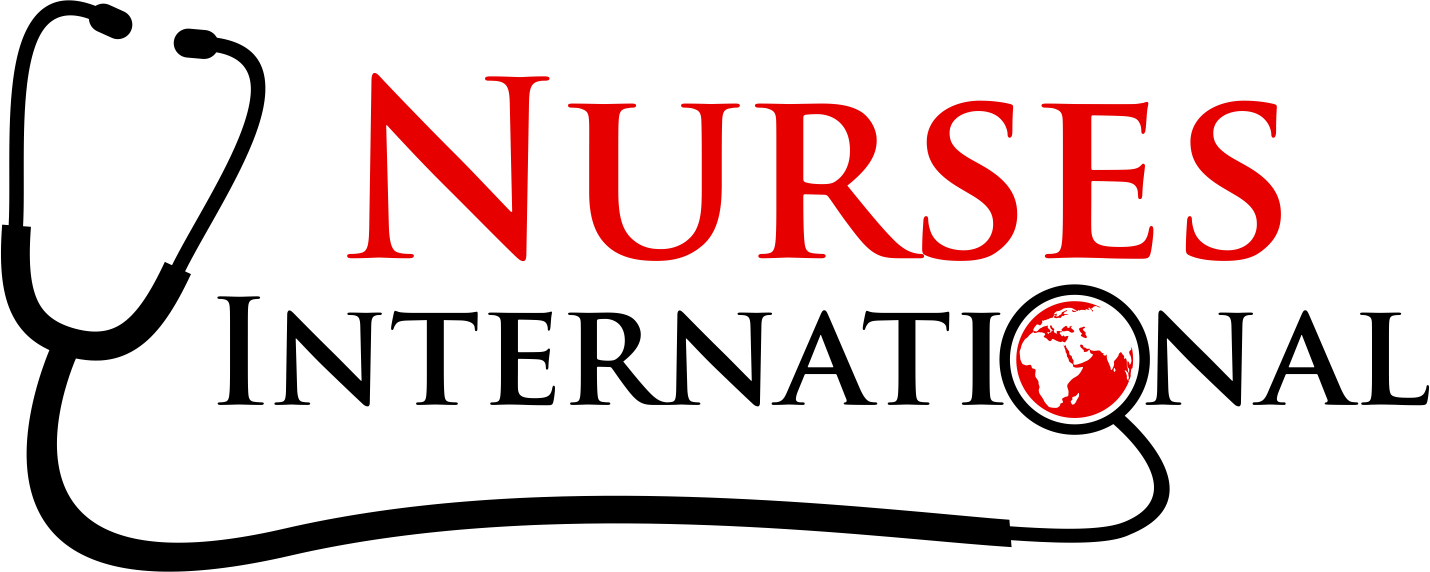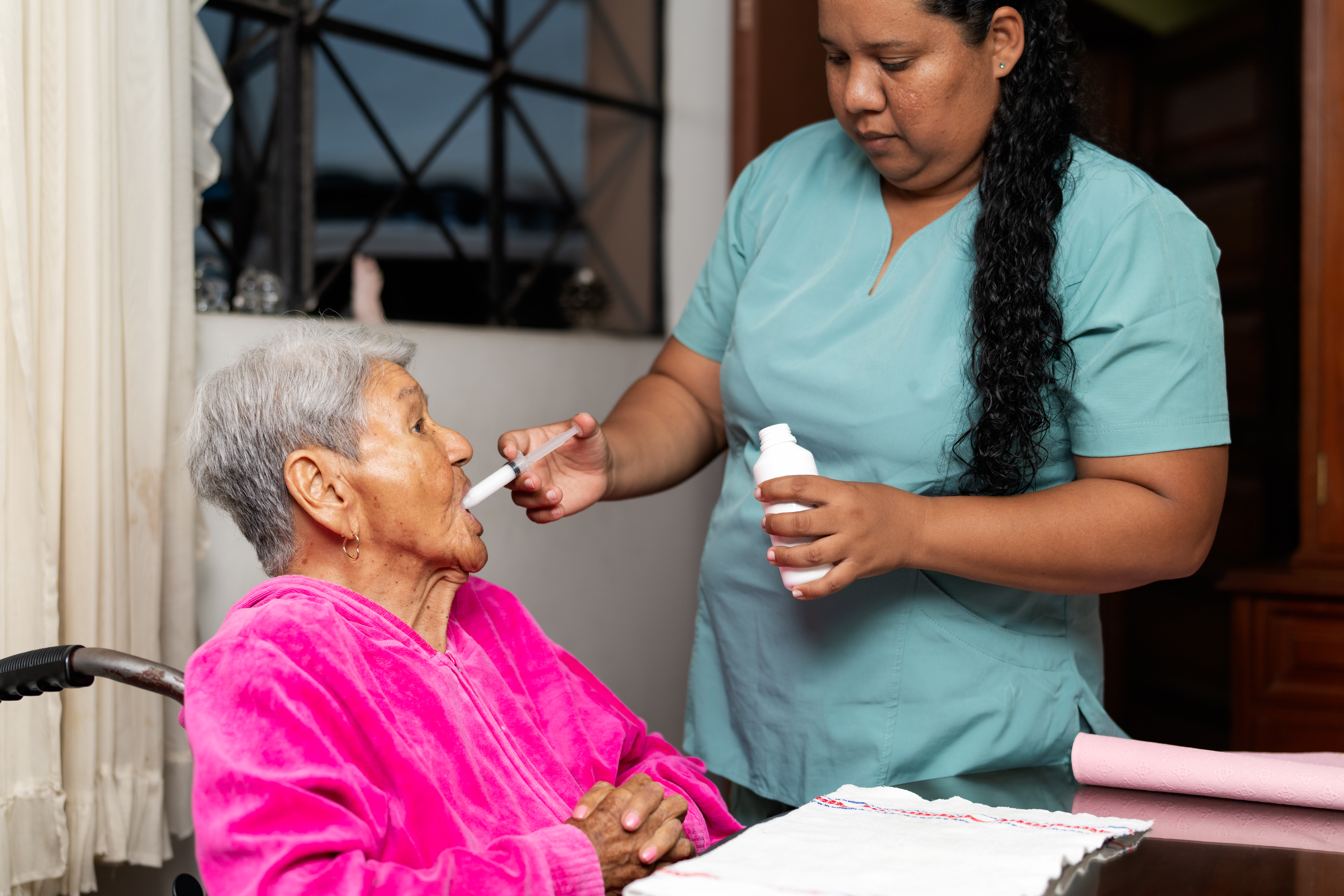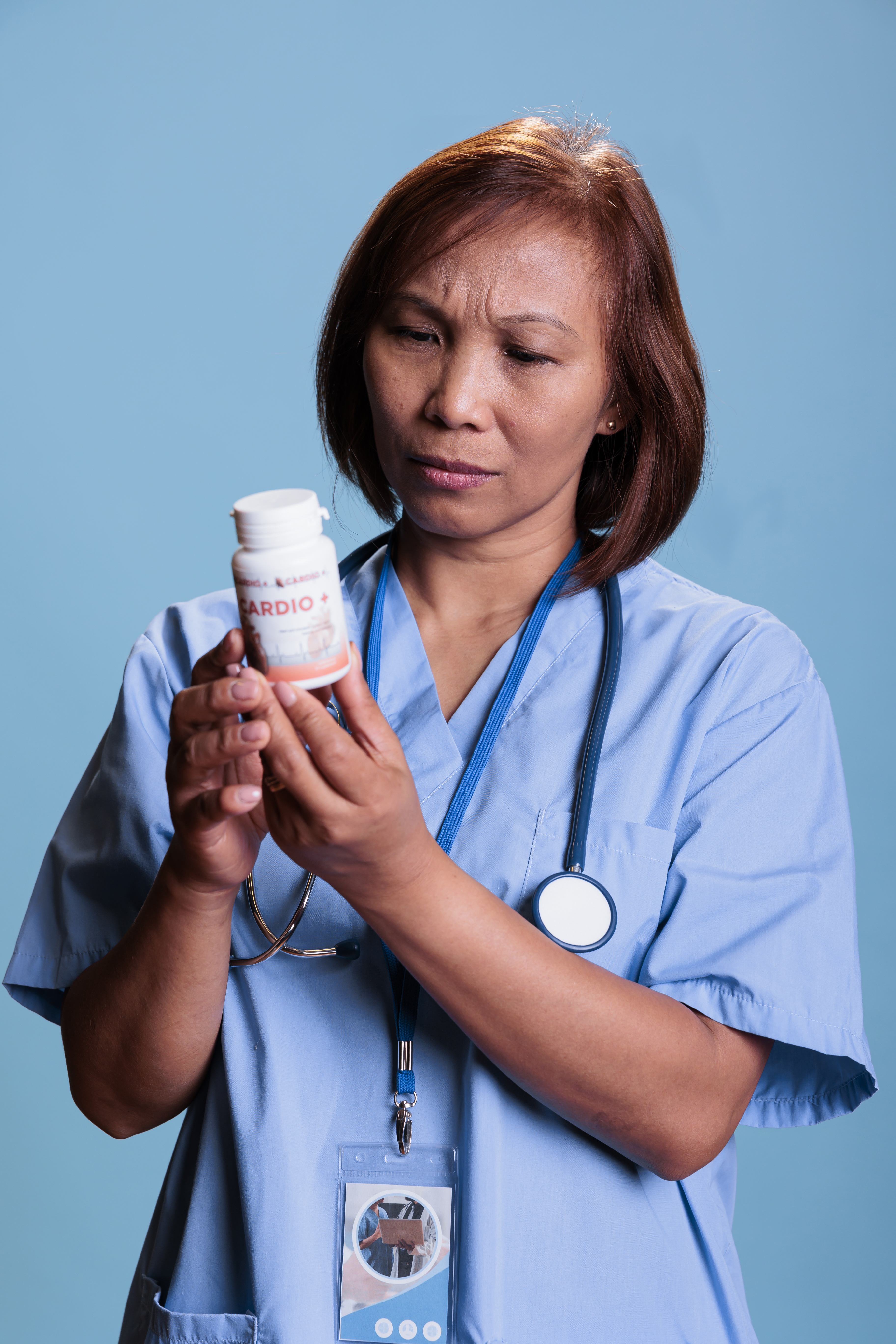-
Course Home PageCourse Home Page

-
Pharmacology Homepage

DISCLAIMER: This content is designed to enhance the study of nursing. This content is generic and is not designed to take into account the specific objectives, needs, and/or circumstances of any particular region or country. To become a nurse, learners must successfully complete a program of study approved by the government or state-regulatory agency in their place of residence. We cannot guarantee that the successful completion of these materials will enable you to practice in your place of residence. Make sure that you are in compliance with the scope of practice of your regulatory body before attempting to put into use or practice any of the knowledge gained.
Course Overview
Welcome to the Pharmacology course. This course is designed to provide nursing students with a comprehensive understanding of pharmacology and its application in clinical practice. We will delve into the essential aspects of pharmacokinetics and pharmacodynamics, explore the classifications and actions of antimicrobial medications, and examine medications specific to body systems. The course emphasizes the nurse's role in safe medication administration and is a crucial component of the nursing curriculum, empowering students to apply pharmacological knowledge in diverse healthcare settings. By integrating legal and ethical concepts, students will be equipped to ensure patient safety and provide culturally competent care.

Course Development
The Pharmacology for Nurses course is a competency-based course developed in partnership with Nurses International (N.I.) and NextGenU.org (NGU). Competencies were developed in collaboration with leading experts in nursing education and practice. The course objectives are aligned with The Essentials: Core Competencies for Professional Nursing Education. It utilizes resources from accredited organizations such as the World Health Organization (WHO), the U.S. National Institutes of Mental Health (NIMH), universities, international guidelines, OpenStax.org, Pressbooks, and peer-reviewed open access peer reviewed nursing textbooks and journals. The Moodle Learning Management System (LMS) supports a flexible and interactive learning environment.
The course was written by the Nurses International faculty and designed in conjunction with the NextGenU.org design team.
The Nurses International core faculty writers and reviewers: Kathleen Capone MS, RN, CNE, EdD; Reenu Varghese DNP, APRN, FNP-C, CNE; Carla Crider EdD, MSN, CNE; and Vanessa Teed MSN, RN, CEN, CGNC.Course Structure
The course includes 6 comprehensive units divided into 2 parts:
Part One: Introduction to Pharmacology
1. Kinetics & Dynamics
2. Antimicrobials
3. Medications Specific to Systems
4. Legal and Ethical ConceptsPart Two: Drug Administration and Calculations
5. Drug/Medication Administration
6. Drug/Medication CalculationsEach unit comprises:
- Individual lessons with accompanying reading materials
- PowerPoint presentations
- Learner self-assessment quizzes
- Critical thinking questions
- Flashcard learning material
- Case study activities
- Unit exams
Assessment
A grade of 80% is required on quizzes and unit exams. Submission of required activities for all case studies and reflection exercises is necessary to progress to the next lesson or section.
The estimated completion time is 81 hours.
A non-graded practice exam is provided at the end of the course material so that learners can use this to help them prepare for the final exam.
A comprehensive final exam consisting of 50 multiple-choice questions is administered at the end of the course.
A grade of 80% is required to pass the final exam. If not achieved, learners may self-remediate and attempt a second exam of comparable content.If unsuccessful on the second exam, the course must be retaken in full and passed to achieve a certificate of completion.
A certificate of completion is available for download upon successful course completion.
To obtain a certificate, learners must complete:
- All reading requirements
- All quizzes and unit exams with a passing grade of 80%
- All activities and case studies
- The final exam with a minimum of 80% (maximum 2 attempts)
- Self and course evaluation forms
Prerequisites
No prerequisites are required
Information for Institutions
NextGenU.org is happy to provide your institution with:
- A link to and a description of the course training
- Your grade on the final exam
- Your work products (e.g., case study activities) and any other shared materials you authorize
- Your evaluations: course and self-assessments
- A copy of your certificate of completion
Obtaining a Degree
NextGenU.org co-sponsors degree programs with institutional partners. To obtain a full degree co-sponsored with NextGenU.org, registrants must be enrolled in a degree program as a student of a NextGenU.org institutional partner. If you think your institution might be interested in offering a degree with NextGenU.org, please feel free to contact us.
We hope that you will find this a rewarding learning experience, and we welcome your assessment and feedback.
For Nurse Educators
The course teacher resources include a study guide that includes a syllabus, recommended teaching strategies, and a skills directory. Nurse educators may contact info@nursesinternational.org with queries/permission to access faculty resources for this course.
Technical Support
For any technical difficulties or course access questions, please contact support@nextgenu.org for assistance.
Disclaimer
This content is designed to enhance your study; we cannot guarantee that the successful completion of these materials will enable you to work in your place of residence, as regulations vary by location. If you plan to practice using your new knowledge, to ensure safety and compliance with your local laws, you must complete a program of study approved by the government and relevant local regulatory agencies in your place of practice.
NextGenU.org does not directly confer academic degrees or guarantee that learning institutions will accept NextGenU.org coursework for credit.
-
Unit 1: Kinetics & Dynamics
Unit Learning Outcomes:
- Discuss the processes of pharmacokinetics
- Explain the principles of pharmacodynamics
- Consider the pharmacodynamics across the life span
- Discuss the nurses role in Pharmacodynamics and kinetics
-
Unit 1: Lesson 1: Pharmacokinetics
Student Learning Outcomes:
Upon completion of this lesson, you will be able to:- Define Pharmacokinetics, Pharmacodynamics, Absorption, Distribution, Metabolism, Excretion
- Explain the First pass effect
- Detail the routes of drug administration
- Explain body-related factors affecting distribution
- Explain phases of metabolism
- Describe the factors affecting metabolism
- Explain the routes of excretion
- Discuss life span considerations for absorption, distribution, metabolism, and excretion
Approximate time required for the readings for this lesson (at 144 words/minute): 3 hours.
3 URLs -
Unit 1: Lesson 2.1: Pharmacodynamics
Student Learning Outcomes:
Upon completion of this lesson, you will be able to:- Define Pharmacodynamics
- Describe Mechanism of Action; Agonists vs Antagonist effects of drugs
- Explain Brand names vs Generic vs Over the counter medications
- Discuss CAM related medications and the nurse’s role in safety
- Explain how drugs are named including classes, suffixes, and routes
Approximate time required for the readings for this lesson (at 144 words/minute): 1 hour and 42 minutes.
3 URLs -
Unit 1: Lesson 2.2: Principles of Drug Response
Student Learning Outcomes:
Upon completion of this lesson, you will be able to:- Define the principles of Efficacy and Dose response
- Explain the principles of:
- - Peak, Onset and, Duration
- - Half-Life and Steady State
- Identify the nurse's role in understanding these principles
Approximate time required for the readings for this lesson (at 144 words/minute): 1 hour and 30 minutes.
3 URLs -
Unit 1: Lesson 2.3: Therapeutic Effects
Student Learning Outcomes:
Upon completion of this lesson, you will be able to:- Define Therapeutic Window, Peak, Trough, and Therapeutic Index
- Describe therapeutic blood level testing and evaluation of drugs
- Discuss the nurse’s role in evaluating medications
Approximate time required for the readings for this lesson (at 144 words/minute): 1 hour and 15 minutes.
3 URLs -
Unit 2: Antimicrobials
Unit Learning Outcomes:

- Discuss the classifications and actions of antimicrobial medications
- Explain the Actions of antimicrobial medications, including side effects
- Explain the administration of antimicrobial medications
- Identify considerations across the life span
- Explore the significance of laboratory values
- Discuss the nurse’s role in administration, teaching, and health promotion
-
Unit 2: Lesson 1.1 Bacteria
Student Learning Outcomes:
Upon completion of this lesson, you will be able to:- Explain the difference between normal and pathogenic bacteria
- Describe tests used to identify pathogens
- Provide examples of infections
- Define broad vs narrow spectrum antibiotics
- Explain the mechanism of superinfection
Approximate time required for the readings for this lesson (at 144 words/minute): 1 hour and 22 minutes.
3 URLs -
Unit 2: Lesson 1.2 Antimicrobial Administration
Student Learning Outcomes:
Upon completion of this lesson, you will be able to:- Identify therapeutic drug effects considerations
- Describe the types of drug interactions
- Describe nurse's role in administering antimicrobials
Approximate time required for the readings for this lesson (at 144 words/minute): 1 hour and 56 minutes.
3 URLs -
Unit 2: Lesson 2.1 Penicillin
Student Learning Outcomes:
Upon completion of this lesson, you will be able to:- Define Penicillin
- Explain the mechanisms of action, indications, and side effects of Penicillin
- Explain the nurse's role in administration and education for Penicillin
Approximate time required for the readings for this lesson (at 144 words/minute): 1 hour and 21 minutes.
3 URLs -
Unit 2: Lesson 2.2 Cephalosporins
Student Learning Outcomes:
Upon completion of this lesson, you will be able to:- Define Cephalosporins
- Explain the mechanisms of action, indications, and side effects of Cephalosporins
- Explain the nurse's role in administration and education for Cephalosporins
Approximate time required for the readings for this lesson (at 144 words/minute): 1 hour and 20 minutes.
3 URLs -
Unit 2: Lesson 2.3 Carbapenems
Student Learning Outcomes:
Upon completion of this lesson, you will be able to:- Define Carbapenems
- Explain the mechanisms of action, indications, and side effects of Carbapenems
- Explain the nurse's role in administration and education for Carbapenems
Approximate time required for the readings for this lesson (at 144 words/minute): 1 hour and 17 minutes.
3 URLs -
Unit 2: Lesson 2.4 Monobactams
Student Learning Outcomes:
Upon completion of this lesson, you will be able to:- Define Monobactams
- Explain the mechanisms of action, indications, and side effects of Monobactams
- Explain the nurse's role in administration and education for Monobactams
Approximate time required for the readings for this lesson (at 144 words/minute): 1 hour and 2 minutes.
3 URLs -
Unit 2: Lesson 2.5 Sulfonamides
Student Learning Outcomes:
Upon completion of this lesson, you will be able to:- Define Sulfonamides
- Explain the mechanisms of action, indications, and side effects of Sulfonamides
- Explain the nurse's role in administration and education for Sulfonamides
Approximate time required for the readings for this lesson (at 144 words/minute): 1 hour and 23 minutes.
3 URLs -
Unit 2: Lesson 2.6 Fluoroquinolones
Student Learning Outcomes:
Upon completion of this lesson, you will be able to:- Define Fluoroquinolones
- Explain the mechanisms of action, indications, and side effects of Fluoroquinolones
- Explain the nurse's role in administration and education for Fluoroquinolones
Approximate time required for the readings for this lesson (at 144 words/minute): 1 hour and 14 minutes.
3 URLs -
Unit 2: Lesson 2.7 Macrolides
Student Learning Outcomes:
Upon completion of this lesson, you will be able to:- Define Macrolides
- Explain the mechanisms of action, indications, and side effects of Macrolides
- Explain the nurse's role in administration and education for Macrolides
Approximate time required for the readings for this lesson (at 144 words/minute): 1 hour and 18 minutes.
3 URLs -
Unit 2: Lesson 2.8 Aminoglycosides
Student Learning Outcomes:
Upon completion of this lesson, you will be able to:- Define Aminoglycosides
- Explain the mechanisms of action, indications, and side effects of Aminoglycosides
- Explain the nurse's role in administration and education for Aminoglycosides
Approximate time required for the readings for this lesson (at 144 words/minute): 1 hour and 10 minutes.
3 URLs -
Unit 2: Lesson 2.9 Tetracyclines
Student Learning Outcomes:
Upon completion of this lesson, you will be able to:- Define Tetracyclines
- Explain the mechanisms of action, indications, and side effects of Tetracyclines
- Explain the nurse's role in administration and education for Tetracyclines
Approximate time required for the readings for this lesson (at 144 words/minute): 1 hour and 15 minutes.
3 URLs -
Unit 2: Lesson 2.10 Antivirals
Student Learning Outcomes:
Upon completion of this lesson, you will be able to:- Define Antivirals
- Explain the mechanisms of action, indications, and side effects of Antivirals
- Explain the nurse's role in administration and education for Antivirals
Approximate time required for the readings for this lesson (at 144 words/minute): 1 hour and 35 minutes.
3 URLs -
Unit 2: Lesson 2.11 Antifungals
Student Learning Outcomes:
Upon completion of this lesson, you will be able to:- Define Antifungals
- Explain the mechanisms of action, indications, and side effects of Antifungals
- Explain the nurse's role in administration and education for Antifungals
Approximate time required for the readings for this lesson (at 144 words/minute): 1 hour and 22 minutes.
3 URLs -
Unit 2: Lesson 2.12 Antimalarials
Student Learning Outcomes:
Upon completion of this lesson, you will be able to:- Define Antimalarials
- Explain the mechanisms of action, indications, and side effects of Antimalarials
- Explain the nurse's role in administration and education for Antimalarials
Approximate time required for the readings for this lesson (at 144 words/minute): 1 hour and 20 minutes.
3 URLs -
Unit 2: Lesson 2.13 Antiprotozoals
Student Learning Outcomes:
Upon completion of this lesson, you will be able to:- Define Antiprotozoals
- Explain the mechanisms of action, indications, and side effects of Antiprotozoals
- Explain the nurse's role in administration and education for Antiprotozoals
Approximate time required for the readings for this lesson (at 144 words/minute): 1 hour and 13 minutes.
3 URLs -
Unit 2: Lesson 2.14 Anthelmintics
Student Learning Outcomes:
Upon completion of this lesson, you will be able to:- Define Antihelmintics
- Explain the mechanisms of action, indications, and side effects of Antihelmintics
- Explain the nurse's role in administration and education for Antihelmintics
Approximate time required for the readings for this lesson (at 144 words/minute): 1 hour and 14 minutes.
3 URLs -
Unit 2: Lesson 2.15 Antituberculars
Student Learning Outcomes:
Upon completion of this lesson, you will be able to:- Define Antituberculars
- Explain the mechanisms of action, indications, and side effects of Antituberculars
- Explain the nurse's role in administration and education for Antituberculars
Approximate time required for the readings for this lesson (at 144 words/minute): 1 hour and 20 minutes.
3 URLs -
Unit 2: Lesson 2.16 Glycopeptides
Student Learning Outcomes:
Upon completion of this lesson, you will be able to:- Define Glycopeptides
- Explain the mechanisms of action, indications, and side effects of Glycopeptides
- Explain the nurse's role in administration and education for Glycopeptides
Approximate time required for the readings for this lesson (at 144 words/minute): 1 hour and 3 minutes.
3 URLs -
Unit 3: Medications Specific to Systems
Unit Learning Outcomes:

- Identify the basic functions of the body systems
- Describe the common disorders of the body systems
- Detail medications specific to body systems and their therapeutic/metabolic effects
- Discuss the nurses role related to medications for each body system
-
Unit 3: Lesson 1: Autonomic Nervous System (ANS)
Student Learning Outcomes:
Upon completion of this lesson, you will be able to:- Review the concepts of ANS
- Explain the nurse's role in administration
- List classifications of ANS medications and their mechanisms of action, indications, nursing considerations, side effects, education needs, and alerts
Approximate time required for the readings for this lesson (at 144 words/minute): 4 hours.
3 URLs -
Unit 3: Lesson 2: Respiratory System
Student Learning Outcomes:
Upon completion of this lesson, you will be able to:- Describe common disorders of the respiratory system
- Describe the nurse's role in administering medications
- Describe the mechanisms of action, indications, nursing considerations, side effects, education needs, and alerts for the following classifications of respiratory medications
- - Antihistamines
- - Decongestants
- - Antitussives
- - Expectorants
- - Beta-2 Agonists
- - Anticholinergics
- - Corticosteroids
- - Leukotriene
- - Receptor Antagonists
- - Xanthine Derivatives
Approximate time required for the readings for this lesson (at 144 words/minute): 3 hours.
3 URLs -
Unit 3: Lesson 3: Cardiovascular & Renal System
Student Learning Outcomes:
Upon completion of this lesson, you will be able to:- Identify the basic functions of the Cardiovascular (CV) and Renal systems
- Identify common disorders of the CV and Renal systems
- Describe the nurse's role in administering medications for the CV and Renal systems
- Describe the mechanism of action, indications, nursing considerations, side effects, education needs, and special alerts of the following medications:
- - Antiarrhythmics
- - Cardiac Glycosides
- - Antianginal (Nitrates)
- - Diuretics
- - Antihypertensives
- - Antilipemics
- - Blood Coagulation Modifiers
- - Erectile Agents.
Approximate time required for the readings for this lesson (at 144 words/minute): 3 hours.
3 URLs -
Unit 3: Lesson 4: Gastrointestinal System
Student Learning Outcomes:
Upon completion of this lesson, you will be able to:- Explain the basic functions and common disorders of the Gastrointestinal (GI) system
- Identify common disorders of the GI system
- Discuss the nurse's role in administering medications for the GI system
- Describe the mechanism of action, indications, nursing considerations, side effects, education needs, and alerts of the following:
- - Antiulcer Medications
- - Antidiarrheal Medications
- - Laxatives
- - Antiemetics
Approximate time required for the readings for this lesson (at 144 words/minute): 4 hours.
3 URLs -
Unit 3: Lesson 5: Central Nervous System
Student Learning Outcomes:
Upon completion of this lesson, you will be able to:- Describe the basic functions and common disorders of the Central Nervous System (CNS)
- Identify common disorders of the CNS
- Explain the nurse's role in administering medications for the CNS
- Describe the mechanism of action, indications, nursing considerations, side effects, education needs, and alerts for the following:
- - CNS Depressants
- - CNS Stimulants
- - Antidepressants
- - Anti Manias
- - Antipsychotics
- - Anticonvulsants
- - Anti-Parkinson's Medications
Approximate time required for the readings for this lesson (at 144 words/minute): 4 hours.
3 URLs -
Unit 3: Lesson 6: Endocrine System
Student Learning Outcomes:
Upon completion of this lesson, you will be able to:- Describe the basic functions and common disorders of the Endocrine system
- Identify common disorders of the Endocrine system
- Explain the nurse's role in administering medications for the Endocrine system
- Describe the mechanism of action, indications, nursing considerations, side effects, education needs, and alerts for the following:
- - Corticosteroids
- - Antidiabetics
- - Thyroid Medications
- - Hormonal Contraceptives
Approximate time required for the readings for this lesson (at 144 words/minute): 4 hours and 30 minutes.
3 URLs -
Unit 3: Lesson 7: Analgesic & Musculoskeletal System
Student Learning Outcomes:
Upon completion of this lesson, you will be able to:- Explain the basic functions of the Musculoskeletal (MS) system
- Identify common disorders of the MS system
- Discuss the nurse's role in administering medications for the MS system
- Describe the mechanism of action, indications, nursing considerations, side effects, education needs, and alerts for the following:
- - Nonopioid Analgesics
- - Opioid Analgesics and Antagonists
- - Adjuvant Analgesics
- - Anti Gout Medications
- - Antimigraine Medications
- - Anesthetics
Approximate time required for the readings for this lesson (at 144 words/minute): 3 hours.
3 URLs -
Unit 4: Legal and Ethical Concepts
Unit Learning Outcomes:

- Discuss federal and state laws, regulations, and guidelines for safe medication administration, including adherence to the State Nurse Practice Act and drug administration standards.
- Identify nursing responsibilities related to controlled substances, medication errors, and patient safety, while recognizing ethical obligations in medication administration.
- Demonstrate patient-centered care by respecting clients' rights, responsibilities, gender, psychosocial factors, and cultural needs during medication administration and drug therapy education.
- Outline nursing actions that ensure safe medication administration within the scope of practice, including health teaching, health promotion, and strategies to prevent and respond to medication errors effectively.
-
Unit 4: Lesson 1: Ethical and Legal Concepts in Medication Administration
Student Learning Outcomes:
Upon completion of this lesson, you will be able to:- Identify key legal and ethical concepts in medication administration
- Identify ethical and professional standards to ensure safe and effective medication administration
- Describe the ANA Code of Ethics and the State Nurse Practice Act
- Apply the nursing process (ADOPIE) to medication administration
Approximate time required for the readings for this lesson (at 144 words/minute): 2 hours.
3 URLs -
Unit 4: Lesson 2: Legal Foundations and National Guidelines
Student Learning Outcomes:
Upon completion of this lesson, you will be able to:- Identify national guidelines for safe medication practices
- Describe the role of PDMP and professional assistance programs
Approximate time required for the readings for this lesson (at 144 words/minute): 2 hours.
3 URLs -
Unit 4: Lesson 3: Cultural and Social Determinants
Student Learning Outcomes:
Upon completion of this lesson, you will be able to:- Assess cultural and social determinants affecting medication administration
- Identify culturally congruent practices
- Describe ways to improve health literacy
Approximate time required for the readings for this lesson (at 144 words/minute): 1 hour and 10 minutes.
3 URLs -
Unit 4: Lesson 4: Preventing Medication Errors
Student Learning Outcomes:
Upon completion of this lesson, you will be able to:- Identify common causes of medication errors
- Identify strategies to prevent medication errors
- Describe safety initiatives that help ensure safe transitions of care
Approximate time required for the readings for this lesson (at 144 words/minute): 1 hour and 40 minutes.
3 URLs -
Unit 5: Drug/Medication Administration
Unit Learning Outcomes:

- Identify the different routes of drug administration
- Discuss sites for parenteral therapy
- Analyze nursing interventions related to drug administration
- Explain equipment and techniques for drug administration
-
Unit 5: Lesson 1: Oral Medication Administration
Student Learning Outcomes:
Upon completion of this lesson, you will be able to:- Explain the advantages and disadvantages of oral medications
- Describe the steps to administering an oral medication
- Explain the nursing implications for oral medication administration
Approximate time required for the readings for this lesson (at 144 words/minute): 1 hour and 17 minutes.
3 URLs -
Unit 5: Lesson 2: Sublingual and Buccal Administration
Student Learning Outcomes:
Upon completion of this lesson, you will be able to:- Explain the advantages and disadvantages of sublingual and buccal administration
- Describe the steps to administer sublingual and buccal medications
- Explain the nursing implications for sublingual and buccal administration
Approximate time required for the readings for this lesson (at 144 words/minute): 1 hour and 15 minutes.
3 URLs -
Unit 5: Lesson 3: Nasal Spray Administration
Student Learning Outcomes:
Upon completion of this lesson, you will be able to:- Explain the advantages and disadvantages of nasal spray administration
- Describe the steps to administer nasal sprays
- Explain the nursing implications for nasal spray administration
Approximate time required for the readings for this lesson (at 144 words/minute): 1 hour and 10 minutes.
3 URLs -
Unit 5: Lesson 4: Parenteral Medication Administration
Student Learning Outcomes:
Upon completion of this lesson, you will be able to:- Describe the types of parenteral medications
- Explain the advantages and disadvantages of each type of parenteral medication administration
- Outline the steps to administer each type of parenteral medications
- Explain the nursing implications for each type of parenteral medication administration
Approximate time required for the readings for this lesson (at 144 words/minute): 3 hours.
3 URLs -
Unit 5: Lesson 5: Transdermal Medication Administration
Student Learning Outcomes:
Upon completion of this lesson, you will be able to:- Explain the advantages and disadvantages of transdermal medication administration
- Outline the steps to administer transdermal medication
- Explain the nursing implications for transdermal medication administration
Approximate time required for the readings for this lesson (at 144 words/minute): 1 hour.
3 URLs -
Unit 5: Lesson 6: Cutaneous Medication Administration
Student Learning Outcomes:
Upon completion of this lesson, you will be able to:- Explain the advantages and disadvantages of cutaneous medication administration
- Outline the steps to administer cutaneous medication
- Explain the nursing implications for transdermal medication administration
Approximate time required for the readings for this lesson (at 144 words/minute): 1 hour and 20 minutes.
3 URLs -
Unit 5: Lesson 7: Vaginal & Rectal Medication Administration
Student Learning Outcomes:
Upon completion of this lesson, you will be able to:- Explain the advantages and disadvantages of vaginal and rectal medication administration
- Outline the steps to administer vaginal and rectal medications
- Explain the nursing implications for vaginal and rectal medication administration
Approximate time required for the readings for this lesson (at 144 words/minute): 1 hour and 40 minutes.
3 URLs -
Unit 6: Drug/Medication Calculations
Unit Learning Outcomes:

- Explain systems of measurement and conversion factors
- Interpret drug labels
- Correctly calculate drug dosages for administration
-
Unit 6: Lesson 1: Systems of Measurement and Conversion Factors
Student Learning Outcomes:
Upon completion of this lesson, you will be able to:- Explain the different systems of measurement:
- - Apothecary system
- - Household system
- - Metric system
- Calculate the conversions between systems of measurement
Approximate time required for the readings for this lesson (at 144 words/minute): 1 hour and 30 minutes.
3 URLs -
Unit 6: Lesson 2: Drug Labels and Precautions
Student Learning Outcomes:
Upon completion of this lesson, you will be able to:- Identify the components of a drug label
- Identify the nursing precautions required for interpreting drug labels
Approximate time required for the readings for this lesson (at 144 words/minute): 2 hours and 15 minutes.
3 URLs -
Unit 6: Lesson 3: Drug Calculations
Student Learning Outcomes:
Upon completion of this lesson, you will be able to:- Explain and demonstrate calculation methods:
- - Basic Formula (Desire over Have)
- - Ratio and Proportion
- - Dimensional Analysis
- - Body Weight Method
- - Body Surface Area Method
- - Pediatric Drug Calculations
- Provide an example of how each calculation method is used
- Explain when and how to round medication doses
- Provide examples of rounding doses for each of the above formula method
Approximate time required for the readings for this lesson (at 144 words/minute): 2 hours.
3 URLs -
Unit 6: Lesson 4: Intravenous (IV) Calculations
Student Learning Outcomes:
Upon completion of this lesson, you will be able to:- Define the principles of intravenous medication administration
- Explain the methods for calculating IV flow rates
- Demonstrate the calculation of IV drip rates using:
- - Formula method
- - Ratio and proportion method
- Calculate IV infusion times
- Identify factors affecting IV flow rates
- Provide examples of common IV calculation scenarios and solutions
- Discuss the nurse's role in monitoring and adjusting IV therapy
Approximate time required for the readings for this lesson (at 144 words/minute): 1 hour and 8 minutes.
3 URLs, 1 SCORM package -
Course and Self Evaluation & Certificate
 In this section, you can provide feedback about this course to help us make NextGenU.org better. Once evaluations are completed, you will be able to download your certificate of completion.
In this section, you can provide feedback about this course to help us make NextGenU.org better. Once evaluations are completed, you will be able to download your certificate of completion.

